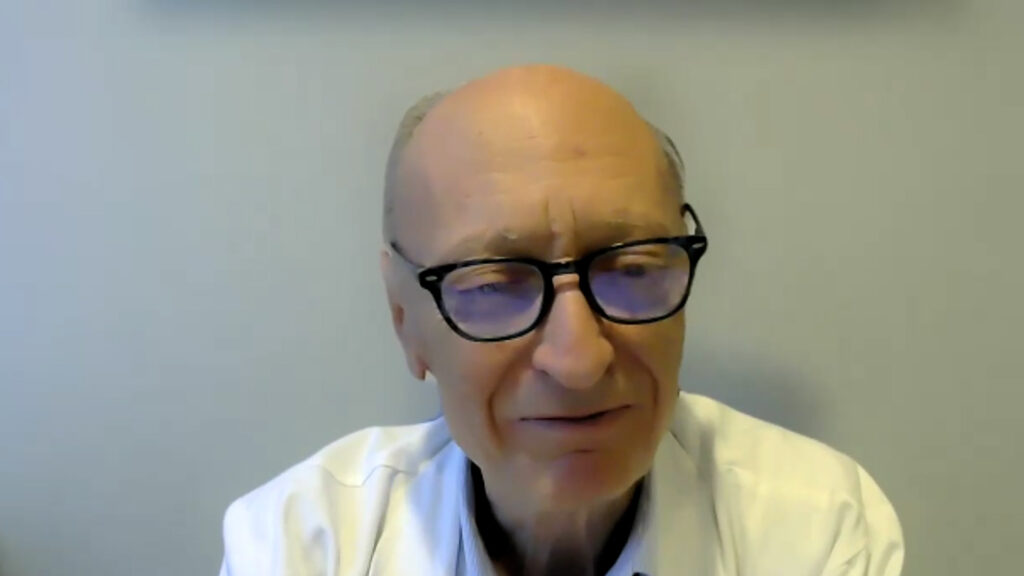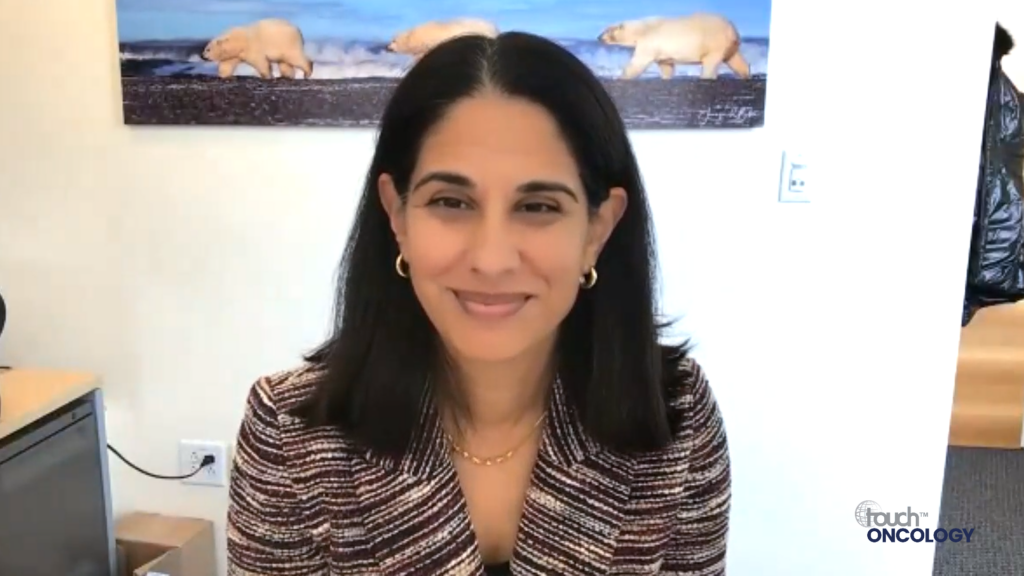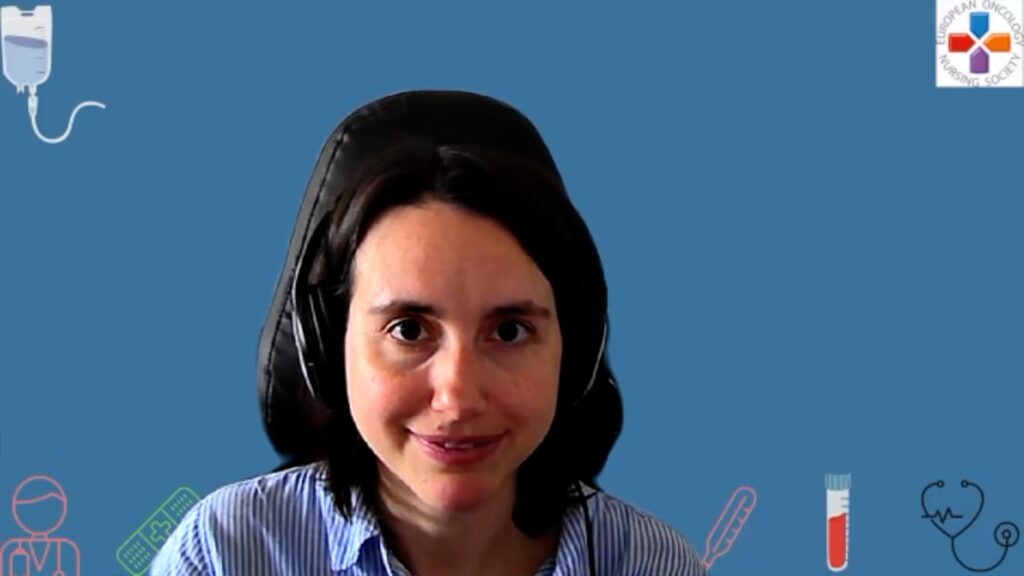The final results of the phase 3, TULIP trial (NCT03262935), which compared trastuzumab duocarmazine (T-Duo) with physician’s choice of therapy in previously treated HER2-positive metastatic breast cancer, were presented at ESMO 2023.
Dr. Philippe Aftimos, the study investigator from the Institute Jules Bordet in Belgium, presented the results at the conference and then discussed them with us at touchONCOLOGY.
Questions
- What are the current unmet needs in the treatment of HER2-positive metastatic breast cancer (MBC)? (0.20)
- What is trastuzumab duocarmazine (T-Duo) and what is its mechanism of action? (1:33)
- What were the aims, design, and eligibility criteria of the TULIP study? (1:58)
- What were the study findings in terms of the primary and secondary endpoints? (2:53)
- What were the study findings in terms of safety? (3:48)
- Are there any questions that remain unanswered and what will be the next steps in the clinical development of T-Duo? (4:36)
Disclosures: Philippe Aftimos has acted as a consultant for Amcure, Amgen, Boehringer Ingelheim, Daiichi Sankyo, Deloitte, Eli Lilly,Gilead, Incyte, Macrogenics, Menarini,Novartis, Synthon and Radius, and recieved grant/research support from Roche.
Support: Interview and filming supported by Touch Medical Media Ltd. Interview conducted by Gina Furnival
Filmed in coverage of the ESMO 2023
Click here for more content on breast cancer & for further ESMO 2023 highlights visit here.
Transcript
I am Phillip Aftimos. I’m a medical oncologist working in breast oncology and precision medicine and I’m also the Head of the Clinical Trials unit in a comprehensive cancer center in Brussels called Institute Jules Bordet, affiliated with the Universté Libre de Brussels.
Q1. What are the current unmet needs in the treatment of HER2-positive metastatic breast cancer (MBC)? (0.20)
HER2-positive metastatic breast cancer has seen a lot of advances in the last few years. So just to set the scene, HER2-positive breast cancer is 20 percent of full breast cancers. This was a very tough cancer to treat because of aggressivity, but we started therapies that are aimed at the HER2 overexpression and the HER2 amplification, and we improved a lot, and actually, the overall survival of patients has improved a lot. There are still some unmet needs. There is now an antibody-drug conjugate called trastuzumab deruxtecan, which is highly potent and approved in the metastatic setting. However, however, we have very little data on treatment after trastuzumab deruxtecan when patients have disease progression. And another area of unmet need, are the central nervous system metastasis. We know that this type of disease has a propensity to go into the brain and the meninges, and, the last few years I have seen some drugs whose activity there, such as tucatinib, but this is still I believe an area of need.
Q2. What is trastuzumab duocarmazine (T-Duo) and what is its mechanism of action? (1:33)
It’s actually a third generation, antibody drug-conjugate targeting the HER2 receptor. It has a cleavable linker and the payload is duocarmycin, which is a minor group binder activating agent with a drug-antibody ratio between 2.4 and 2.8.
Q3. What were the aims, design, and eligibility criteria of the TULIP study? (1:58)
This is a phase 3 study, that randomized patients 2:1 to T-Duo versus treatment of physician’s choice, which was chemotherapy in combination with an anti-HER2 therapy. So this could have been eribulin plus trastuzumab, capecitabine plus trastuzumab, lapatinib plus capecitabine, vinorelbine plus trastuzumab.
So patients, should have had advanced breast cancer that was HER2-positive. This could have been metastatic breast cancer or locally advanced, not amenable to surgical resection. Four hundred and thirty seven patients were randomized, and, they should have received two prior lines of therapy for metastatic disease, or should have received, TDM1.
Patients with stable brain metastases were allowed in the study.
Q4. What were the study findings in terms of the primary and secondary endpoints? (2:53)
The primary endpoint was presented at ESMO 2021, so this was centrally assessed progression free survival and there the study met its objective, with a PFS of 7 months for the investigational arm of T-Duo versus 4.9 months in the treatment of physician’s choice and the hazard ratio was 0.36.
Together endpoints included investigator assessed PFS, overall survival response rate, adverse events and the quality of life. For the secondary endpoint, there was no improvement, statistically significant improvement in overall survival. Numerically there was an improvement with T-Duo from 21 months versus 19.5 months, but again, as I said, this was not statistically significant.
Q5. What were the study findings in terms of safety? (3:48)
T-Duo, like other antibody-drug conjugates, actually, has, mainly ophthalmological adverse events. So either keratitis or conjunctivitis. So those were the most prevalent adverse events in the investigational arm. So it was as high as 78 percent, including 28 percent that were Grade 3, and about 21 percent of patients had treatment discontinuation, and about 23 percent had dose modifications.
Like, also, like other antibody-drug conjugates, there was some interstitial lung disease (ILD). So the rate, the prevalence was 7.6 percent.
Grade 3 was 2.4 percent, and, about 5 percent of patients discontinued because of ILD.
Q6. Are there any questions that remain unanswered and what will be the next steps in the clinical development of T-Duo? (4:36)
Well I believe the study, was performed, whilst trastuzumab deruxtecan was not yet the standard of care.
So we still, we still have the question of what to do post-trastuzumab deruxtecan currently. Approved as early as the second-line or even first-line in patients that relapse quickly after trastuzumab and pertuzumab.
For me, the logical step would be to evaluate efficacy post T-DXd but also, do a larger study in the HER2-low subset because this is also now an area of investigational anti-HER2 therapies, but you also have an approved drug that is, again trastuzumab deruxtecan.
Subtitles and transcript are autogenerated.












